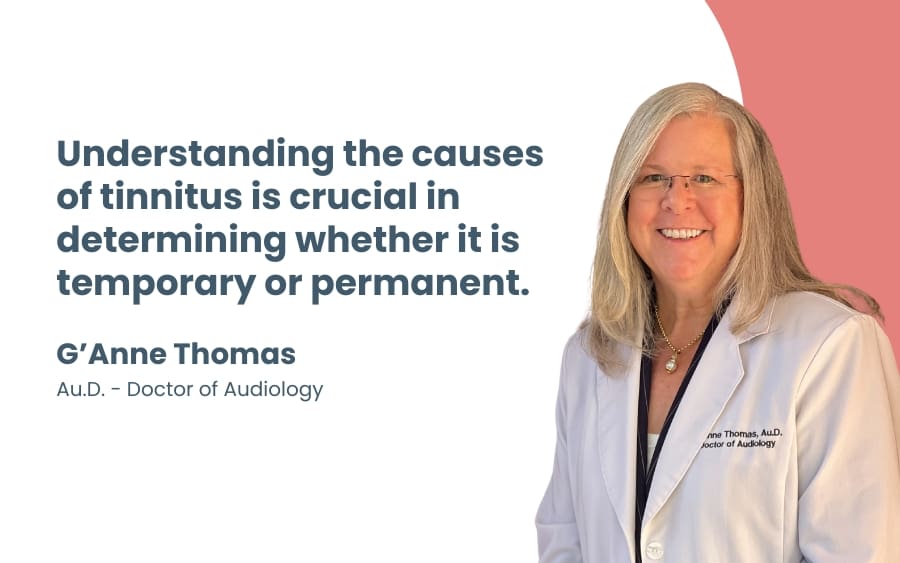
Is Tinnitus Temporary or Permanent? Understanding and Managing Tinnitus
Tinnitus, often perceived as a ringing, buzzing, or clicking sound in the ears, is a common condition that affects a significant portion of the population.
At Hearing & Balance Clinics, we specialize in diagnosing and managing tinnitus, providing patients with effective strategies to cope with this condition.
In this article, we’ll delve into whether tinnitus is a temporary issue or a permanent condition, and the various ways you can manage it.
What Is Tinnitus?
Tinnitus is a symptom, not a disease, and it manifests as a perception of sound when there is no external source. It can be a ringing, hissing, buzzing, or clicking noise, and it varies greatly in pitch, volume, and duration from person to person. The American Tinnitus Association (ATA) provides a detailed explanation of this condition.
Temporary vs. Permanent Tinnitus
Tinnitus can be either temporary or permanent, depending on its underlying cause. Temporary tinnitus is often experienced after exposure to loud noise, such as a concert, and typically resolves on its own.
It can also be caused by short-term factors such as ear infections, earwax blockage, or certain medications, and it generally subsides once the underlying issue is addressed.
Permanent tinnitus, on the other hand, may result from prolonged exposure to loud noise, leading to noise-induced hearing loss, or may be the result of age-related hearing loss or certain health conditions.
Causes of Tinnitus
Understanding the causes of tinnitus is crucial in determining whether it is temporary or permanent. Some common causes include:
Age-Related Hearing Loss
As we age, hearing loss can occur, often accompanied by tinnitus. A study by the National Institute on Deafness and Other Communication Disorders highlights this correlation.
Exposure to Loud Noise
Repeated or prolonged exposure to loud sounds can damage the inner ear, leading to tinnitus and hearing loss. This is common among musicians, construction workers, and people regularly exposed to loud environments.
Ear Infections or Blockages
Temporary tinnitus can occur due to infections or blockage in the ear canal, often resolving with medical treatment.
Certain Medications
Some medications are known to cause tinnitus as a side effect, including certain antibiotics, cancer medications, and diuretics.
Managing and Coping With Tinnitus
While there is no cure for tinnitus, various management strategies can help alleviate its impact:
Hearing Aids for Tinnitus
Modern hearing aids can be effective in managing tinnitus, especially for those with hearing loss. They amplify external sounds, making tinnitus less noticeable.
Tinnitus Retraining Therapy (TRT)
This therapy combines sound therapy and counseling to help the brain learn to ignore tinnitus sounds.
Cognitive Behavioral Therapy (CBT)
CBT helps patients modify their reactions to tinnitus, reducing stress and improving coping mechanisms.
Sound Therapy
Using external sounds to mask or distract from tinnitus can provide relief, especially during quiet times like sleeping. White noise machines or apps can be particularly helpful.
Lifestyle Changes
Reducing stress, improving diet, and avoiding exposure to loud noises can help manage tinnitus symptoms.
When to Seek Professional Help
If you’re experiencing persistent or bothersome tinnitus, it’s important to seek professional help.
An audiologist can perform a comprehensive tinnitus evaluation to determine the cause and severity of your tinnitus and recommend appropriate tinnitus solutions.
They may also provide tinnitus counseling to help you understand and cope with your condition.
At Hearing & Balance Clinics, we offer specialized tinnitus therapy and tinnitus management services. Our experienced audiologists use the latest techniques and technologies to provide effective relief and improve the quality of life for our patients.
Reach out to us today to seek the help you or a loved one may need in battling tinnitus.
Dr Nathan Griffins staff was great! Melissa at the front desk was awesome! Amber explained the next step and was excellent! Scheduling appointments was easy. And depending on what you are having done there are multiple offices. - Rebekah Monroe





